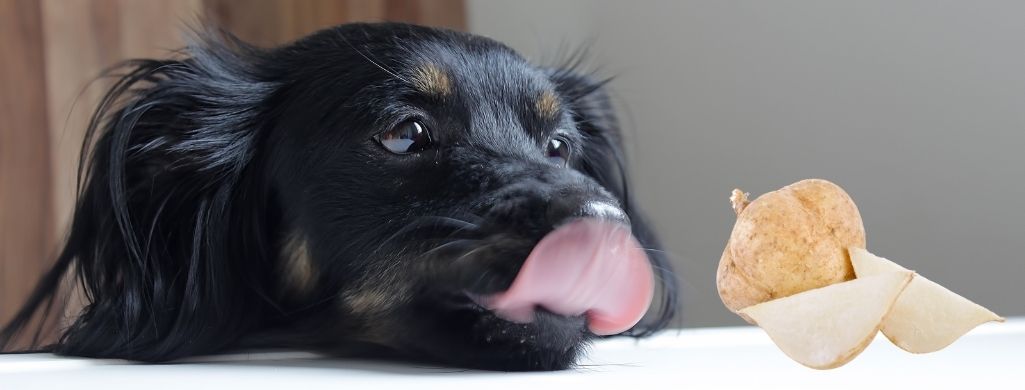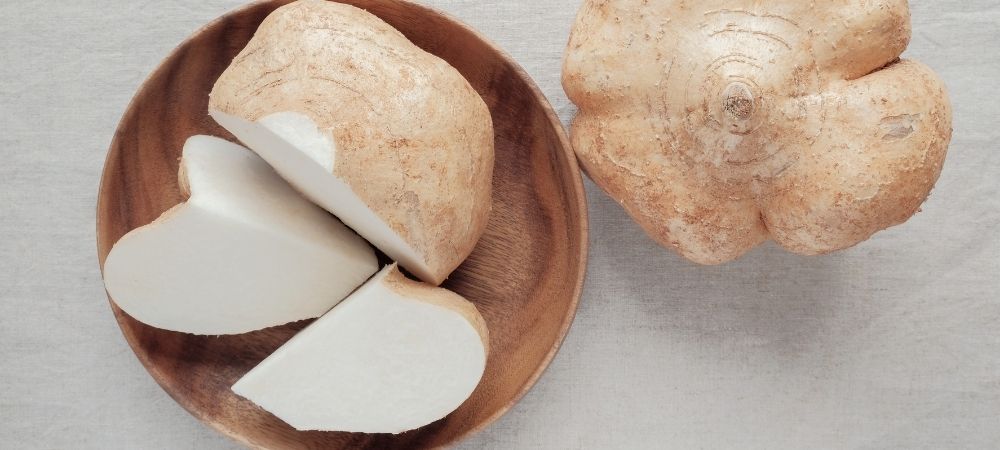
My furry friend Piper and I were at a supermarket yesterday when we came across an interesting plant. It said “jicama.”
— Oh, yeah, the Mexican potato. I hear it’s also great for dogs — the cashier told me as I packed the newest treat I discovered.
I got interested. Can dogs eat jicama, and are there any health benefits to it?
Later, as I enjoyed its sweet taste, I started reading, and here is what I found out about jicama.
Can Dogs Eat Jicama?
Yes, dogs can eat the root or the flesh of jicama. Dogs should not eat other parts of the plant because they can be toxic.
You should always slowly add new food to existing dog food in case of digestive issues. Monitor your dog’s reaction to see if there are any problems. Jicama root is a relatively safe food for dogs, but it’s always best to be cautious.
Is Jicama Good for Dogs?
Jicama, or Mexican turnip, is mildly sweet in taste. The raw root of the plant is safe for dogs to eat and can offer some fantastic health benefits to your furry friend.
Low Calories
Like jackfruit, jicama is very low in calories and rich in nutrients — 3.5 oz of jicama contains a mere 38 calories. This makes jicama perfect for dogs on a weight management diet. Jicama won’t add to the weight, but it will nourish your dog and offer excellent nutritional benefits.
Rich in Vitamins
Jicama is very rich in vitamins C, E, and A.
Vitamin C is important for your dog’s immune system. It helps fight infections and ward off diseases. Additionally, vitamin C contributes to collagen synthesis, making it indispensable for bones and joint health.
Vitamin A is vital for your furry companion’s eyesight and fur. Animals who are deficient in vitamin A often have unhealthy fur. They may also experience night blindness.
Vitamin C and vitamin E are antioxidants. Jicama also has beta-carotene, another antioxidant that helps fight off infections and diseases.
High in Minerals
Jicama is packed with essential minerals like calcium, potassium, iron, and phosphorus. These minerals offer a range of health benefits for your dog.
Calcium is vital for healthy joints and bones, especially in pups and pregnant dogs.
Potassium helps your pet manage the electrolyte balance inside the body, so it stays hydrated. It is also essential for heart health. If your dog has kidney problems, you should monitor their potassium intake.
Iron is crucial for red blood cell production. Without enough iron, your dog can become anemic.
Phosphorus is another mineral that’s essential for bone health and helps regulate the body’s metabolism.
All these minerals make jicama a great food for keeping your dog healthy and fit.
High Fiber Content
Jicama is very high in dietary fiber. A 3.5 oz of jicama has about 0.17 oz of dietary fiber. Dietary fiber helps improve the digestive health of dogs and humans alike.
Dietary fiber is recommended if a dog has stomach problems or weight issues. Don’t overdo it, though, as too much fiber can further irritate the stomach.
Inulin
Inulin is another important and beneficial ingredient in jicama. Inulin is prebiotic, which means that it helps create good bacteria in your dog’s gut.
This is beneficial for overall health and can help improve a pet’s mood and digestion. Inulin also helps dogs lose weight if they are overweight.
Is Jicama Bad for Dogs?
Jicama root is pretty safe for our canines. However, if dogs eat the jicama plant, there could be a few issues. Let’s look at those.
Rotenone
It’s crucial to note that the jicama root is the only safe part to eat. Jicama skin, seeds, leaves, and stems can even be toxic to dogs because they contain rotenone.
Rotenone is a substance typically used in pesticides and insecticides, but it naturally occurs in parts of the jicama plant. Rotenone is highly toxic to animals and can even be fatal.
If your dog ate other parts of the jicama plant, you have to watch them carefully for symptoms of rotenone poisoning. It’s best to call the vet immediately.
Digestive Issues
Some dogs can experience digestive issues when eating jicama root. The plant has high fiber content, and too much of it may irritate the stomach.
If your pet experiences belly aches or diarrhea after eating jicama, you should not feed it to them again. You could, however, try cooked jicama root instead.
In some cases, if the issue doesn’t clear up quickly, you may need to get in touch with a veterinarian.

Different Parts of Jicama
Dogs can safely eat jicama root, but what about other parts of the jicama plant? Let’s look at different parts and whether they are suitable for our furry companions.
Can Dogs Eat Raw Jicama?
Yes, dogs can safely eat raw jicama in moderation.
Unlike potatoes, raw jicama is fine for our pets. As a matter of fact, raw jicama is often served with lime and spices for human consumption.
As for dogs, it is best to serve jicama without any additional ingredients. Don’t use citrus fruits or spices because they can irritate the dogs’ stomachs.
Can Dogs Eat Fresh Jicama?
Yes, fresh jicama is perfectly safe for dogs, just like the raw. However, bear in mind that only the root, i.e. the flesh, is safe for our canines to consume.
If you want, you can feed uncooked jicama to dogs. Or, why not fry it in a pan? Don’t add too much fat, as this is unhealthy and potentially harmful to the dog.
Furthermore, don’t add too much salt or spices, especially onions and garlic. All of these are toxic and deadly to dogs.
Can Dogs Eat Jicama Leaves?
No, jicama leaves are not safe for dogs to eat.
The leaves of the jicama plant contain rotenone, which is toxic to animals. If ingested, rotenone can cause vomiting, diarrhea, and even death.
Keep your dog away from the jicama leaves. If your dog consumes the leaves, it’s best to call a veterinarian immediately.
Can Dogs Eat Jicama Plants?
No, jicama leaves, bean pods, stems, skins, and seeds are not safe for dogs to consume.
While the plant’s root is safe for our pets, everything else has rotenone in it. This means that your dog can get very sick if they ingest anything but the root flesh.
Rotenone is toxic to animals and can even prove fatal.
If you suspect that your dog ate anything but the root flesh, call a vet right away.
Can Dogs Eat Jicama Sticks?
Jicama sticks are simply sliced jicama root. So, yes, dogs can safely eat jicama sticks.
Make sure to peel the jicama first since the skin might contain rotenone. It could also have residue of pesticides if it had been treated.
How to Prepare and Serve Jicama to Your Dog
You can serve jicama raw or cooked. For the first time, the cooked jicama might be a better choice. Simply cut or shred cooked jicama into small pieces and combine them with dog food.
If you want to, you can slice it and fry the pieces in a pan with a little fat. Don’t add too much salt, as this might upset your dog’s stomach and cause health issues. If a dog eats too much salt regularly, it could lead to sodium ion poisoning, which can be fatal.
Don’t use any spices such as garlic or onion, as these are extremely toxic to dogs.
Another option is to boil jicama until it turns soft and add it to dog food. You can also mash the boiled jicama since the canine will digest it more easily that way.
What Should You Do if Your Dog Ate Jicama
Eating jicama root is unlikely to cause health problems. However, jicama does have a lot of fiber, so dogs with sensitive stomachs may experience digestive problems if they eat too much.
Usually, the symptoms will include upset stomach, diarrhea, and in some cases, vomiting. These symptoms resolve within a few hours. If they don’t, it is best to seek veterinary advice.
If your dog ate other parts of the jicama plant and not the root, they might experience rotenone poisoning. Rotenone is highly toxic to dogs and can be fatal. Take the dog to a vet clinic immediately.
Rotenone Toxicity
Rotenone is found in jicama leaves, bean pods, and seeds. The symptoms of rotenone toxicity in dogs include:
- Vomiting
- Diarrhea
- Drooling
- Frequent urination
- Lethargy
- Depression
- Constricted pupils
- Respiratory failure
- Muscle tremors
- Difficult breathing
If your dog shows any symptoms of rotenone poisoning, take them to a vet clinic immediately.
The Best Vegetable You’re Not Eating
Dog owners should try jicama for themselves, too, as it is packed with nutrients and offers many health benefits. As for our furry friends, jicama is an excellent addition to their diet — it offers many great nutrients and is low in calories.
Just remember that not all parts of jicama plants are edible. Your dog should only get jicama root. Don’t overfeed them either because the root contains loads of dietary fiber. Too much fiber can irritate your pet’s stomach.
Sometimes, new things in our lives can be great. As with any new food, make sure to consult a vet first. Once they approve jicama, you and your pooch can embark on an amazing adventure of discovering all the ways to enjoy this exciting plant together.

